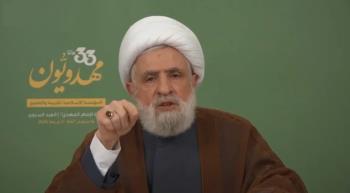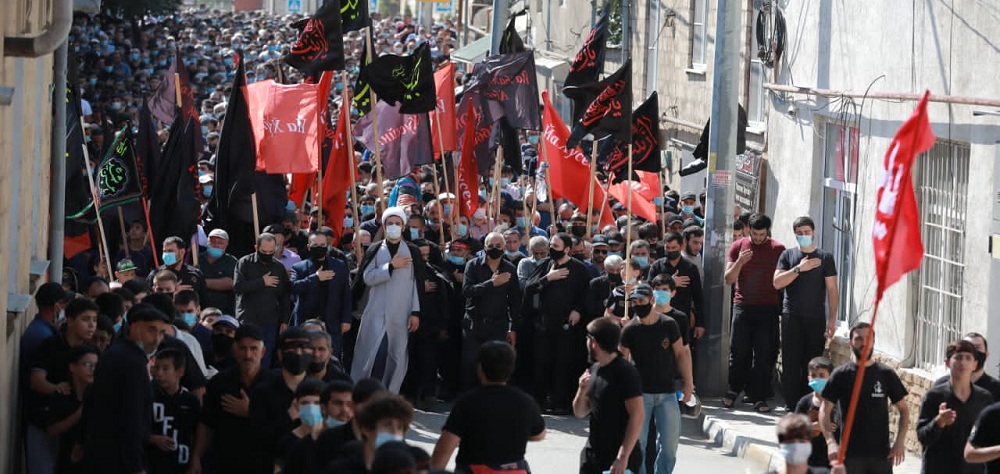Alwaght- A country with the second biggest Shiite population relative to its total population, Azerbaijan in the month of Muharram takes a religious atmosphere with its people marking the martyrdom of Imam Hussein, the grandson of Prophet Muhammad. The mourning ceremonies in the country are held as enthusiastic and spirited as before this year and all Azerbaijani cities are marking Ashura. In the first night of Muharram, people attended the mosques and Husseiniyahs for mourning.
The Shiites in Azerbaijan every year install black flags and signs of Muharram to mark Imam Hussein's revolt against oppression. This year like the years before, they held mourning ceremonies in various parts of the country. Some lovers of Imam Hussein transformed their houses into Husseiniyahs and shared their videos and images online in demonstration of their love to a man sacrificed himself for freedom.
Caucasus Muslims Board (CMB) as the main institution supervising arrangement of religious ceremonies in Azerbaijan like past years released a statement, inviting people of various faiths to join the mourning ceremonies in the country. It called on the mourners to consider the health protocols in their commemorations.
The Muslims of Azerbaijan lived together with the people of Iran in a single cultural and civilizational atmosphere in the past centuries. So, Islamic rules and rituals are considered as the major values of the society in this country. Although the Muslims of Azerbaijan became citizens of the Russian Empire in the early 19th century according to the treaties of Golestan and Turkmenchay, they are still loyal to their Islamic rituals, and although there were some restrictions from the communists, religious ceremonies and especially Muharram mourning in this country are alive and celebrated more magnificently every year.
In this Caucasian state, the majority of Shiites have a special belief in the month of Muharram, and in Shiite areas, they usually do not listen to music until Arbaeen, which marks the culmination of mourning ceremonies. People do not wear colorful clothes, especially red clothes, on the days of Tasu'a and Ashura, and religious families who can afford, distribute food and arrange mourning ceremonies in their houses.
Ganja is one of the cities in Azerbaijan where the Muharram mourning ceremony is held in a specific style. In this city, the mourning ceremonies start from the first day of Muharram, and men and women mourn in groups in a holy shrine in the city. On the day of Ashura (tenth day of Muharram), the shrine is filled with mourners and people perform their 'nazrs' (special vow or commitment to carry out an act) in this place. In addition to different cities of Azerbaijan, such as Baku and Ganja, the Autonomous Republic of Nakhchivan is also one of the areas where people mark Muharram as populously as possible. Lamentations and eulogies are recited, chests are beaten, sheep beheaded in sacrifice, and food distributed in the days of Muharram. They normally close down their work places and shops to join the ceremonies. In recent years, blood donation has been a humanitarian trend in various Azerbaijani cities.
Religious restrictions in Azerbaijan
Although the Shiites account for 85 percent of Azerbaijan population, the government imposed many restrictions on holding mourning ceremonies in the month of Muharram in the past decade, and Shiites cannot easily hold their commemorations.
Seeking to modernize and Westernize the country, President Ilham Aliyev considers religious rituals and customs to be in conflict with his plans, and driven by this mindset, in the past years, he has taken steps to remove religious culture and rituals by drafting new laws. And Muharram ceremonies are no exception.
According to the instructions released by the government a few years ago, Ashura rituals can only be held in mosques, and holding any religious ceremonies in homes and gathering in the streets is illegal and violators are prosecuted. At the same time, the display of religious and Ashura symbols has been banned in the streets and public places, and because of this, the mosques are replete with mourners in Muharram, and the more the restrictions are tightened, the more Shiites are eager to mark Ashura. These restrictions have caused a wave of public protests in recent years, and a number of religious leaders in the country have been arrested and imprisoned by the government.
This year, too, the restrictions are strictly in place, triggering protests abroad. In protest to the crackdown on the Ashura ceremonies, Muslim activists in London on Thursday stormed Azerbaijani embassy in London. Footages appear to show them waving flags with Imam Hussein name on them, taking down Azerbaijani flag and replacing its with a green flag symbolizing Muharram mourning. The group, naming itself Alliance of Khodam Al-Mahdi (Servants of Al-Mahdi), said that the storming came in response to harassment of a women in the capital Baku for writing 'Oh Imam Hussein', a slogan dominant in mourning ceremonies, on the wall of her house. The move reflected the restrictions the Azerbaijanis face in marking Ashura. They are even banned from lamenting Imam Hussein in their houses and attaching black flags in their cars as a mourning sign.
With these restrictions seeing their scope widening every year and with the authoritarianism Aliyev is increasingly showing, a total ban on Muharram ceremonies in the coming years is not unlikely. He translates religious ceremonies a sign of backwardness and bigotry and hence an obstacle ahead of modernization of the country. Aliyev shows extremism even more than Western leaders whose countries are majority Christian. Every year, big European and American cities witness Ashura mourners holding their ceremonies freely and without the least restrictions. But in a majorly-Shiite country like Azerbaijan, Muharram is banned. These government crackdowns not only generate public discontentment but also aversion to Baku leaders grows larger day by day.
Restrictions on Imam Hussein mourning ceremonies by Baku in a country with Shiite majority has no good end. Experiences of countries with similar crackdowns is outburst of public anger and even regime change. Azerbaijan leaders may suffer the same fate.



























